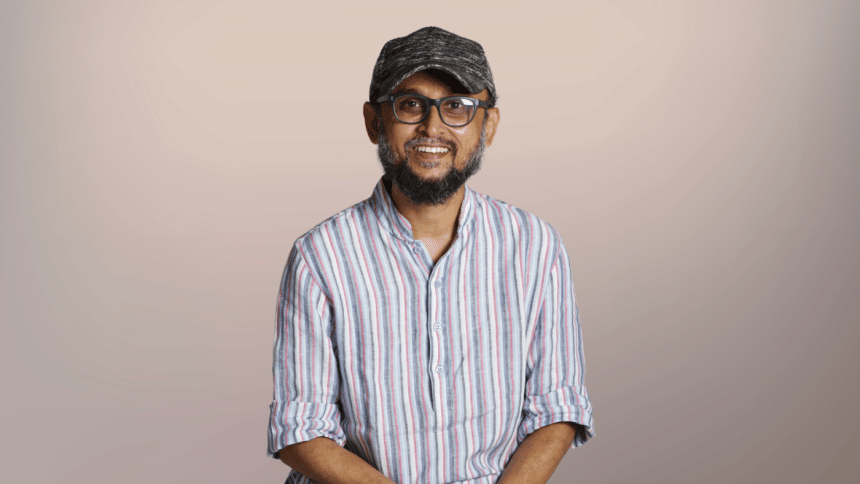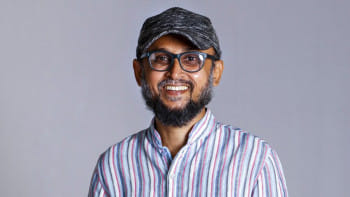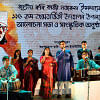‘The entire system needs an overhaul’

Since taking charge at the Ministry of Cultural Affairs, Mostofa Sarwar Farooki has faced a steep learning curve. The director has had to learn to navigate the complexities of government bureaucracy and a febrile political climate, where controversies are quick to erupt.
The latest was caused by the Bangla Academy's recent cancellation of its awards in the face of criticism of the selection. "To be honest, the entire system needs an overhaul," said Farooki in his first in-depth interview since joining the interim government. "The fellows who go on to crown the award recipients among the nominees are given only 30 minutes to decide. Now you tell me, is that enough time to research someone's body of work?"
The adviser emphasised the importance of bringing new thoughts and ideas to the forefront.
Right now, Bangla Academy itself is an institution that needs to be remodelled philosophically and bureaucratically. Awami League created fellows according to their own preferences over the last 15 years. Imagine if someone with published works praising Hitler after the fall of Nazism were to receive a literary award — how would that seem?
Politics is nothing new for the filmmaker-turned-adviser, who believes "filmmaking is a political job". However, under the previous government, he said, he had to be careful when expressing his views on social media.

Asked about those views, Farooki cited the Gonojagoron Moncho in 2013, which he called "the beginning of fascism."
"They used to claim that if we believed in our Liberation War, we weren't allowed to ask questions about it," he said. "Isn't that the same as what right-wing extremists say? They are the other side of the same coin."
According to the adviser, the cultural sector suffered incessantly under Sheikh Hasina. He alleges that the previous pervasive self-censorship meant that no form of art was allowed to challenge the government in any way.

When one of his films was blocked from release, he understood that he had been sent "a very dangerous signal". "Even though I continued to voice my dissent on social media, I was also concerned about the safety of my family and me". The interim government's Commission of Inquiry on Enforced Disappearances has since received 1,676 complaints of enforced disappearances.
Things changed dramatically in the August of 2024. Two months after the uprising, Farooki was asked to join the government by Information Adviser Nahid Islam. Although he did not take the offer seriously at the time, he decided to accept it when he learned that the request came directly from Chief Adviser Dr Muhammad Yunus.
I decided to speak to the chief adviser, and I told him I didn't want to take up the role, but within three minutes he convinced me," the adviser recalled. "He said 'Farooki, you need to do something for the nation.
Now in office, he has ambitious plans: he wants to restore Panamnagar and turn Cox's Bazaar into a cultural capital, hosting art festivals and colleges — "think of Cannes, think of Venice", he said.

Since taking office, he has prioritised workshops by different cultural organisations, holding concerts and festivals, and producing short films to publicise the interim government's goals. "Theatre production workshops are taking place in different towns," he said, adding that more than 150 different programmes across multiple disciplines have occurred in the last three months—sometimes focusing on Baul songs, sometimes on art exhibitions.
His mention of Baul songs raised the question of security: in various parts of the country, mazars (shrines) have been attacked by religious fundamentalists. In November, a Baul festival was cancelled by local authorities, citing security concerns. The adviser responded defiantly, "We will double the number of Baul events in a month," but sought to downplay the threat. "They are not a general tendency," he said. 'If you consider that police forces are still being reorganised and compare the number of incidents to those under the previous government, you will see that we are doing really well.

"In every country, there are some extreme right-wingers," he conceded. "However, this narrative, in part, is propaganda spun by Indian media." He added, "Sheikh Hasina was not a secular leader at all — she used the mere notion of secularism to divide the nation. The Liberation War and secularism were shields to hide her wrongdoings."
Nonetheless, many cultural figures in Bangladesh feel a natural affinity for the Liberation War and secularism. Are they now free to produce work with those themes? "If, as an artiste, you don't challenge power and decide to make a film that suits the narrative of the government, that is called propaganda," he said, adding that it was "a tragedy for art in general is when artistes don't take the side of the oppressed, but the side of the oppressors."
Whether artistes formerly aligned with the Awami League will continue to receive government grants for their films or theatre projects will depend, Farooki said, "on the scripts, but the formula they used before to get funds—praising Sheikh Hasina and Sheikh Mujib—that will not work." Other than that, the adviser believes that one is now entirely free to create films or other artworks that criticise the government.
"We need to remind ourselves not to make the same mistakes as the previous government," he said, stressing political and cultural inclusivity.

The adviser is now turning his attention to the country's cultural heritage, neglected for decades; there is no national modern art gallery, and thousands of the best paintings by 20th-century masters languish unseen in institutional storage at Shilpakala and the National Museum. Apart from two rooms in the National Museum, there is no permanent display of modern art in a country prized for the quality of its art.
"There are 807 Zainul Abedin paintings dumped in a storage unit being destroyed," he acknowledged. "Our cultural ministries never knew what their job was—they didn't care or know how to project and protect Bangladeshi cultural heritage."
Farooki has channelled his efforts for reform through the governing council of the National Museum, which controls six other museums across the country, appointing architect Marina Tabassum as chair. "She has been given the mandate and freedom to change our National Museum. We told Marina, 'Please prepare the reform plan, even if it takes three years, as I believe whoever comes after the election will want to implement it.'"
The adviser acknowledged the budget issue in the museum sector. The room holding the National Museum's collection of 807 Zainul Abedin paintings lacks a dehumidifier, for instance.
However, many artists and curators argue that, without a dedicated National Gallery, it will be impossible to do justice to the wealth of Bangladeshi modern art. Farooki refused to be drawn on whether a new art gallery is needed. "We need to structure the curation and change the way we preserve things," he highlighted but left open the possibility of a new art museum.
Meanwhile, in early January, Farooki received notice that he would be responsible for creating a new museum on the site of the old Gono Bhaban, dedicated to the July Revolution. This museum, he hoped, would be an "immersive" experience that would "take you on the traumatic 15-year journey that Bangladesh went through." He is planning a soft launch on August 5 this year, the anniversary of the uprising's victory, after a nationwide open competition to choose the design.
A committee had already formed in November, with Ebadur Rahman as convener. That committee began making plans for the new museum, but principal responsibility was transferred to the cultural ministry in early January. The adviser described it as "a very important priority" for his ministry and has already formed an advisory committee for the museum, including Mr Rahman, which will meet within a week.
Meanwhile, Mostofa Sarwar Farooki continues to struggle with a tight budget and a bureaucracy he described as slow and outdated: "They [the previous regime] destroyed the country's cultural sector for over a decade," he concluded. "Just imagine how much effort we'll need to fix it." Will he stay on to finish the job? "I don't have any plans to be a minister," the adviser said, "but I would be happy to be an informal adviser."
Cyrus Naji is a writer and researcher working in Dhaka.

 For all latest news, follow The Daily Star's Google News channel.
For all latest news, follow The Daily Star's Google News channel. 










Comments